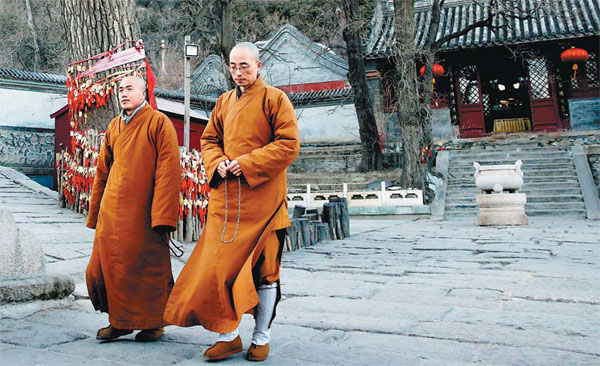Abundance of academic stars lights up monastery
Updated: 2014-02-28 08:45
By Cheng Yingqi (China Daily Europe)
|
|||||||||||
|
Master Xianxin (right) and Master Xianyu at Longquan Monastery in Beijing's Haidian district. Jiang Dong / China Daily |
In the secular world, such a concentration of brainpower would be worthy of a top-notch scientific institution.
A PhD in fluid mechanics from Tsinghua University, a philosophy graduate from Peking University, a math Olympiad gold medalist, a professor from Beihang University, a researcher from the Chinese Academy of Sciences and a German language teacher.
Breakthroughs in quantum physics have been achieved with less. But for this group, a quantum of solace may be more appropriate.
All of the above are Buddhist monks, or in the process of becoming monks, at Longquan Monastery in Beijing's Haidian district.
Just under an hour's drive from the bustling Beijing suburbs, crab-apple trees line a country lane that leads to the monastery, with its 1,000-year-old gate.
In the front yard, trees at least 100 years old stand proudly, a contrast to the newly built gray roofs and red walls of the monks' living quarters.
When a post on guokr.com, a popular science and technology Internet community in China, highlighted the religious life of scientists, some netizens attributed almost mythical powers to the monastery. They called it "a temple of sci-tech".
One urban myth doing the rounds claimed that when Zhang Xiaolong, senior vice-president of Tencent, was developing the mobile phone software WeChat, he moved into the temple to seek inspiration.
One day, the story goes, Zhang was so frustrated by his slow progress that he tore the data to shreds. A monk saw the shredded paper, painstakingly pieced it together, wrote something on it, and thus allowed Zhang to solve his problem.
The monks, however, are quick to dispel that story.
"The Internet is sensationalizing the temple, but the fact is that life here is rather simple," says Master Xianxin, who is in charge of a volunteer group named the Longquan Monastery information technology group.
"Most of the time, we are too busy studying dharma to be involved in mundane pursuits."
In 2010, Xianxin's first winter in the monastery, he developed a system to manage the 70 drawing rooms and some 200 lay Buddhists who study dharma there.
Word circulated about the spreadsheet, and a number of volunteers from IT companies came to help the monastery and gradually formed the IT group.
In 2011, Xianxin and several volunteers attended a mobile developer conference to learn more about the frontiers of information technology.
"Well, that was the first time I attended such a conference," Xianxin says. "Now I ask the volunteers to come here.
"I am not a technical master. What I do with the IT group is basically to hold a meeting once a week to discuss tasks we are carrying out with the volunteers."
The 30 volunteers in the group have a clear division of labor, including project management, software services and network maintenance. They also catalog the Buddhist scriptures to assist the monks collating texts.
"What we are doing, however, is not as much as outsiders might imagine. With a 30-person IT company, you might be able to achieve a lot, but most of our volunteers are part-time, so their time and resources are limited," Xianxin says.
A difficult path
Being a volunteer is a principal pathway to becoming a monk.
Xianxin used to be a programmer before proclaiming himself a Buddhist, though he read Buddhist books at home even then.
Then he met Master Xuecheng, the abbot of Longquan Monastery, who holds many Buddhist leadership positions in and out of China.
"I started volunteering at the temple, where I met new people and suddenly realized the full immensity of life.
"Living a monastic life is so different from learning Buddhism from books, so I decided to learn about Buddhism in a more constructive way," Xianxin says.
The pathway from volunteering to monkhood, however, is not easy.
"The tests for volunteers and lay Buddhists are very strict," says Master Xianyu, who is in charge of food and drink supplies at the temple.
The volunteers preparing for monkhood are called jingren, and are given a period to examine their ability to endure hardship and their faith before becoming novice monks. After that, the tests continue until they receive precepts, a ceremony for their formal conversion.
All the menial work at the temple, such as farming, cutting firewood, cooking and cleaning the toilets, is done by jingren and novice monks.
"Actually we never ask for anything from jingren and novice monks, they volunteer for the jobs," Xianyu says.
In the temple kitchen, volunteers kneel to clean the floors.
"Down the hill in the secular world, people do things for exchange, for money or for a living. But here everybody is working with enthusiasm for nothing but their heart," says a jingren surnamed Wang, who quit her job at an IT company four months ago and moved into the monastery.
"When I came here, I felt joyful, which is the reason I decided to stay," Wang says.
Zhu Xuehua, also a volunteer, came across the monastery by chance two years ago while climbing a nearby mountain with friends.
Out of curiosity, Zhu researched the temple on the Internet and found they were looking for weekend volunteers.
"At first, I came here to experience temple life, just doing menial jobs like pulling up weeds in their vegetable garden. Then I joined the IT group and was deeply attracted by the team atmosphere, as well as the temple lifestyle," she says.
"Each volunteer has a unique attachment to the Longquan Monastery. Fate brings them here."
Xianxin says: "Many volunteers knew little about Buddhism when they joined the IT group. But I believe, as they arrived and settled, they are all pursuing goodness in their hearts.
"Since Buddhist dharma teaches people to be sober, better and wiser, the inner demand of each team member elevates the mind. That, I believe, is our cohesion."
Academic study irrelevant
Haidian district is one of the most educated areas in the country, and it is reasonable to suppose that the average educational background of monks in the monastery is higher than average, Xuecheng told Phoenix TV in an earlier interview.
However, higher education does not carry the same weight in the monastery as it does in the secular world.
"Educational background is a key criteria in the secular world. In a Buddhist temple, your achievement depends on your faith and resolve," Xianyu says, adding that a monk's academic record is not relevant to one's knowledge of Buddhism.
But temple life is not an easy option, nor a way of avoiding hard work or an escape from the pressures of the secular world, Xianyu says.
"Just have a look at our regular schedule; you may find that life is not so easy in a temple."
The monks get up at 3:55 am every day, do their morning spiritual practice from 4:30 am to 5:30 am, and attend lectures from 5:30 to 7 am.
They have one hour for breakfast, and then do their own work, such as comparing classics, until 11:10 am.
Most monks do not eat anything after lunch. The afternoon work hours last from 1:15 pm to 5 pm, when the evening practice starts. They then have an evening lecture until 8:30 pm, before more work until about midnight.
"This is not easy for anyone who does not feel peace and happiness from what he or she does," Xianyu says.
"In the secular world, people might separate living and working from their interests. But for us, we feel the joyfulness from our spiritual practice and labor, and this joyfulness is the same, regardless of whether someone has a higher education or not."
chengyingqi@chinadaily.com.cn
(China Daily European Weekly 02/28/2014 page26)
Today's Top News
Ukraine mobilizes after Putin's move
War in Ukraine a long shot, experts say
Beijing-area air better than before
EU condemns China's terrorist attacks
Abe 'shut the door': spokesman
Putin not yet decided on use of force in Ukraine
28 dead in Kunming violence
China, UK hold dialogue on ties
Hot Topics
Lunar probe , China growth forecasts, Emission rules get tougher, China seen through 'colored lens', International board,
Editor's Picks

|

|

|

|

|

|






